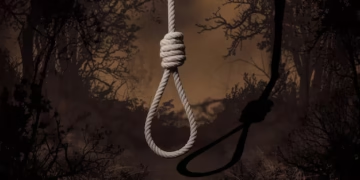The highest cases of suicides among Warrap women prompted the UN Mission in South Sudan to convene a debate on taboo-laden mental health issues.
To UN, at least four suicides were reported in February alone; the heartbreaking instances are aggravated by the stigma associated with mental health issues and as a result in a lack of response from local authorities and community members alike.
For instance; just before dawn on a February morning, the smell of burning thatch suddenly filled the air. Neighbors immediately rushed to the scene, and yet they arrived too late.
However, inside what used to be a home, they found the charred remains of a young woman and her children.
“She never spoke of the deep pain she must have been going through, but the day before she took her life, her husband brought home a new wife,” said one of the neighbors who made the macabre discovery.
Unfortunately, this tragedy is part of what appears to be a growing trend in Warrap State. Three comparable examples of women taking their own lives, and sometimes those of their children, occurred in February alone.
In an effort to break the taboo surrounding psychological suffering and its often fatal consequences, the Kuajok field office of the UNMISS – decided to make the most of International Women’s Day by raising awareness about emotional distress, its causes, and effects.
Survivors, advocates for women’s rights, and community members spoke openly about their own or others’ suffering during an all-female community plenary discussion at the Kuajok Women and Girls’ Friendly Center, a safe space built with peacekeeping mission funding.
The even was also attended by neighbours, police, courts, traditional leaders, just to mention but a few.
Adultery, sexual or other types of assault and abuse, and husbands adding or replacing an existing wife with a new and frequently younger ones are also contributing factors to distress among South Sudanese women and girls.
In her remark, a women’s rights advocate highlighted that, based on her considerable experience speaking with impacted families, males ascribe women’s suicide to their weakness rather than abuse, mistreat or desertion.
“There is no sympathy; on the contrary, many families are ashamed of even mentioning the name of a daughter who has killed herself,” she said
“Nobody asks themselves what has pushed a woman or girl to commit suicide. Nobody discusses how they could have helped before disaster strikes,” she added.
A recent case provides a textbook example. When a well-known general found out that his daughter had ended her life, he turned grief into punishment.
“He considered it an insult to his name. Instead of checking on the mental health of his other daughters, he had them arrested and thrown in jail, without any kind of trial,” a social worker familiar with the tragedy said.
Women’s hopes of justice are frequently shattered if and when their grievances are brought before the traditional, male-dominated courts they are referred to.
“When I had been assaulted and went to court, they laughed at me,” a young woman from Kuajok said. “The chief told me ‘It’s better you just marry him, at least he will take care of you’”.
Such attitudes among law enforcers mean that most families choose to settle incidents of rapes or abuse by means of forced marriages.
“My parents told me this was better than being known as a girl who went to court. They said I should accept my fate,” another survivor said, with a chief from a traditional court admitting that the justice system is biased.
“The court is for men. Women, we tend to believe, solve things within the home and that’s it, but maybe we need to listen more,” said chief pondered.
But what comes first: talking or being prepared to listen?
“Psychosocial support is desperately needed, but what can we do to prevent suicides if we don’t talk about these issues? It’s deeply frustrating,” admitted a counsellor specialized in traumas.
UNMISS Gender Affairs Officer Roda Sube believes in women’s right to life, dignity, and a more positive self-image.
“If a woman has agreed to be a second or third wife, why does she feel that she must kill herself when a fourth or fifth is brought? It is often because she believes that she has no other identity, no other future outside of marriage. We need to change that mindset.”
Another survivor who took part in the conversation, who now works for a women’s rights organization, concurred with Ms. Sube’s “diagnosis”.
“If someone had just told me that I could stand on my own I wouldn’t have spent so many nights wishing that I was dead. Now I understand and know that I deserve to live, and that makes all the difference in the world.”












